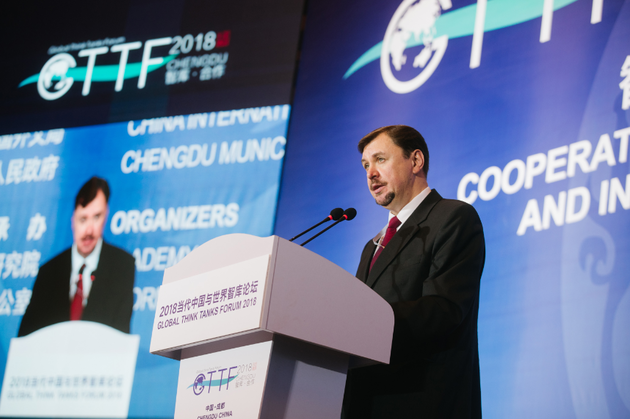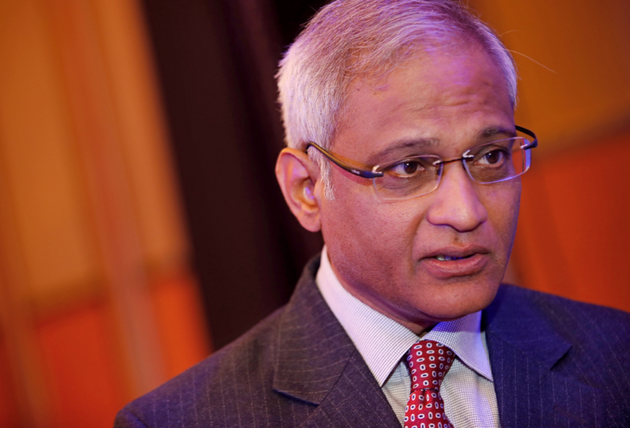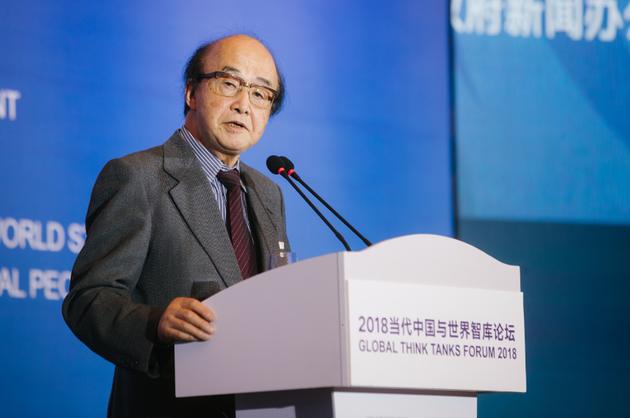Nov. 23 (NBD) -- On the occasion of the 5th anniversary of the Belt and Road Initiative ("BRI") and the 40th anniversary of China's reform and opening-up, the world's top think tanks gathered in southwest China's Chengdu where the Global Think Tanks Forum 2018 kicked off on Thursday.
When having interviews with NBD, experts of think tanks from all over the world spoke highly of the BRI achievements over the past five years. Dmitry N. Baryshnikov, vice-dean of School of International Relations at Saint-Petersburg State University, said to NBD that the BRI is an innovative, inclusive international and interregional governance model.
Baryshnikov also approved of the collaboration between cities and think tanks, saying that international think tanks support global cities in economic research and strategic planning and also inject impetus into the internationalization of global thinking.

Dmitry N. Baryshnikov (Photo/Zhang Jian)
One has to see not only today in global governance
Srikanth Kondapalli, director of Centre for East Asian Studies at Jawaharlal Nehru University of India, told NBD that as a new paradigm of international cooperation, the BRI incrementally has changed the international order and brought in five policy options which are policy coordination, trade promotion, financial integration, connectivity and people-to-people contacts.
Baryshnikov held that for global governance, global vision and strategic planning are important. "You have to see the whole system and you have to see not only today, but also tomorrow and the day after tomorrow."
"The creator of the idea and implementer of the BRI see the day after tomorrow. They understand the global logic to develop globally in all the aspects starting with defense strategy and finishing by regional development, global trade, interregional transport systems. That is innovative to use all the possibilities and include all the players," Baryshnikov added.
In addition to the vision to see a whole picture, global governance should be reflective of changed times. In Kondapalli's view, the major demands of BRICS countries including China is that the global governance structure needs to be reflective of times. For example, international institutions such as the United Nations, the IMF, the World Bank and solutions to issues including regional security and energy need to be reflective of changed global governance structures. So they are demanding reform.

Srikanth Kondapalli (Photo/Zhang Jian)
Eiichi Shindo, director general of Belt and Road Initiative Japan Research Center, echoed Kondapalli's opinion. Shindo explained to NBD that the 21th century is knowledge game century when the information revolution and knowledge can make power. The world governance in the 20th century can’t work anymore because of the change of the world.
Shindo regarded the BRI as the symbol of new global governance. "China now has the power to make influence and initiative concerning governance, regional or global. It’s time for China to take initiative to change the world. That's why the conference is themed with global governance."
Ties between cities and think tanks facilitate global governance
Shindo recommended city diplomacy to realize the BRI. "The basic origin of the Silk Road is city roads from the west to the east and from the east to the west," he said.
As cities go between nations and citizens which are two of three entities of international relations, cities function more flexible platforms for international cooperation, Shindo elaborated.
An increasing number of cities are cooperating with think tanks in pursuit of international governance. This forum is a case in point. Chengdu, a city which is showing stronger capability of integrating into the world economy, also intends to take this opportunity to make use of the wisdom of the international think tanks to explore new development momentum.

Eiichi Shindo (Photo/Zhang Jian)
Think tanks frequently and intensively provide intellectual analysis and support for international cooperation at different levels. It is estimated that there are as many as 7,800 think tanks in the world and more than 500 in China.
Baryshnikov underscored that cooperation between global cities and think tanks not only promote development of the cities themselves, but provide platforms for global governance.
He saw the World Cities Culture (Tianfu) Symposium 2018 held in Chengdu this June as a good example of how to fuse the vision of cultural cooperation between global cities and enhance innovative global governance.
In Baryshnikov's opinion, think tanks which center on the BRI could promote global governance through high-tech, innovation, scientific and education cooperation.
Those experts also shared with NBD their insightful observation and understanding with regard to innovative global governance which is part of the forum theme.
Shindo held that innovation is the key word to win the knowledge game and innovation is a win-win game. "Nowadays, one automobile can’t be produced in one country."
Innovation is not to redo mechanisms of organization or mechanism of reform that we had already, but to create a new stage of these mechanisms, Baryshnikov noted.
Email: gaohan@nbd.com.cn


 川公网安备 51019002001991号
川公网安备 51019002001991号





